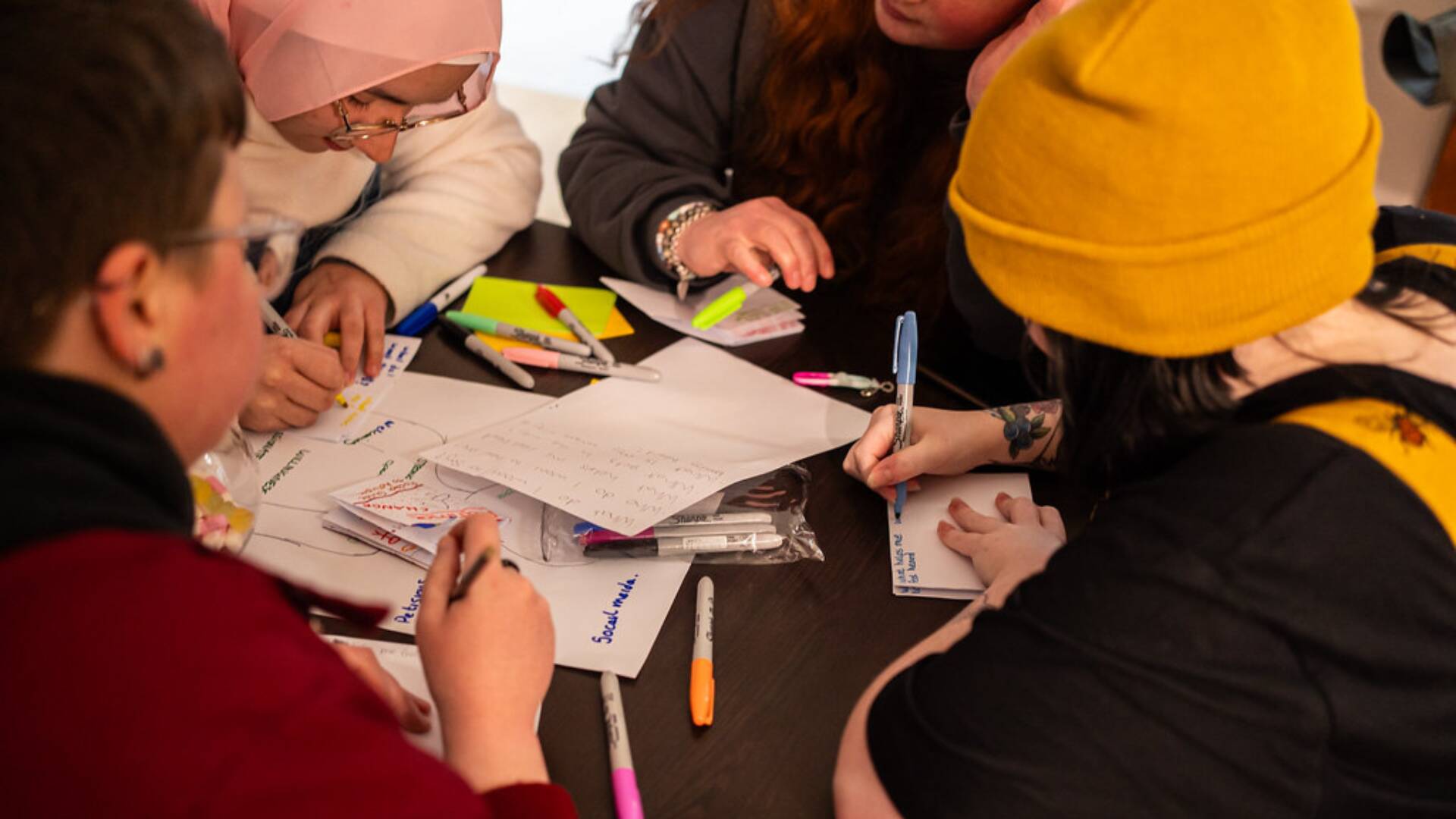
29.10.25

“Today is the slowest day of the rest of your life.” When digital entrepreneur and inclusion champion, Martha Lane Fox shared these words at Dundee’s Economic Summit in summer 2025, she captured the pace of change we’re all feeling and which young people are currently navigating. The world of work is evolving faster than we can plan for, and the question no longer feels like what jobs will exist in the future, but what skills will endure?
Across every future skills report globally, from the OECD to the WEF Future of Jobs 2025, the most in-demand cognitive skills by employers for the future repeatedly include: creativity, communication, collaboration, and critical thinking/problem-solving skills. The skills that AI can’t easily replicate; the ones that enable communities, teams, and industries to imagine, adapt and stay resilient in the face of change.
Creative thinking ranks among the top five fastest rising skills, alongside analytical thinking and tech literacy, particularly in knowledge economies such as the UK; with emerging economies now heavily investing in creative and digital education to capture this shift.
Young people in Scotland also believe these skills are critical for their futures. As highlighted (below) in Skills Development Scotland’s last annual Pupil Voice survey of almost 11,000 S4–S6 pupils aged 16+ years, the very same skills appear which feels notable coming directly from young people themselves, rather than policy analysts.
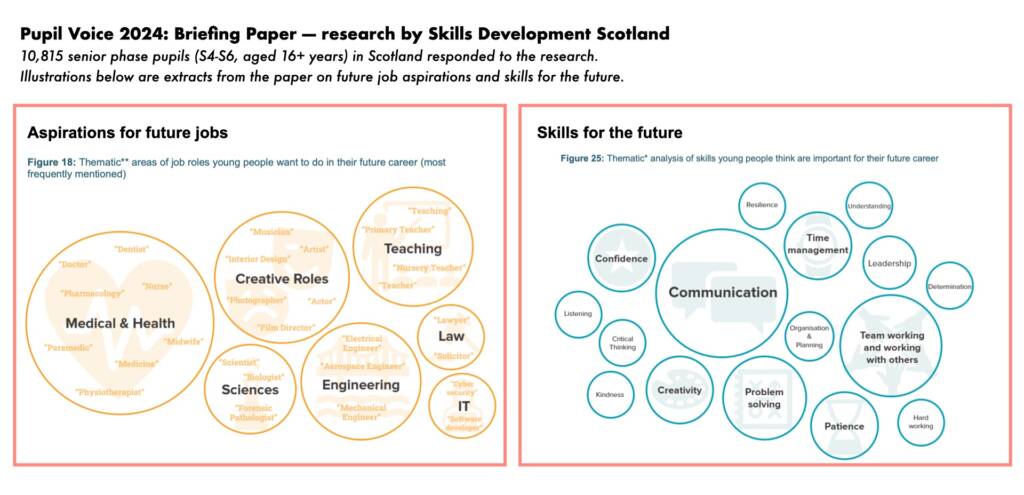
Equally inspiring and revealing are the career ambitions shared in the same report. When asked which sectors they most want to work in, the Creative Industries ranked second (17%) behind only Medicine and Health (18%) – ahead of Engineering, Law, and Science. Amongst young people at risk of disengagement, a creative career rises to first place (18%). So for young people facing barriers, one in five aspire to a creative career.
Behind these numbers lies a deeper question – how many young people understand creative careers, or feel equipped to build one? Creative work is often project-based and self-employed, and covers a much broader range of industries than is often realised. The issue isn’t that young people want creative careers, but that too few are supported to create them – revealing a wider gap between the skills the world needs now and the pathways that could help young people realise their potential.
Despite culture and creativity being central to Scotland’s national identity and self expression – and despite the Creative & Digital Industries being one of the UK’s leading sectors, there are systemic challenges: investment is sparse, apprenticeships are rare, recruitment is limited, careers advice still often sees creative ambition as risky or unrealistic. These barriers persist and even back in 2021 our Taking Space in the Dundee’s Creative Industries report highlighted the same problems.
So, if thousands of young Scots are saying creativity is my future and we know that creativity is the foundation for our future, why are we failing to meet their needs?
Dundee is a city where many young people face complex barriers that grow as they do. By the time they reach early adulthood, wellbeing falls sharply. Scotland’s Census 2022 shows that while 79% of children rate their health as “very good” in the city, this drops to just 59% among 16-24 year-olds – and more than one in ten describe their mental health as fair, bad, or very bad. This mirrors wider national trends: adolescence and early adulthood bring spikes in anxiety, depression, and long-term health challenges. Behind every stat is a story of a young person trying to find belonging, meaning, and a way to thrive in a rapidly changing world.
Declining poor mental health rates among young people is an acute issue, and while the arts are rightly associated with building belonging, confidence, and the ability to process complex emotions; the evidence shows that it depends on how participation happens. The change comes when creative activity is connected, youth-led and sustained – when it can strengthen the same capacities that sustain civic life and innovation.
National research confirms this. Reports such as British Council’s UK Arts, Culture and Young People: Innovative Practices and Trends and Creative Scotland’s Ten Years of Time to Shine highlight how youth-led co-created practices equips young people by validating their voices, and enabling much-needed third spaces of safety, community, and future-building. The arts often provide a language and framework for exploration that makes these social conditions possible – turning abstract wellbeing goals into lived experience, and giving young people tangible tools to shape the world around them.
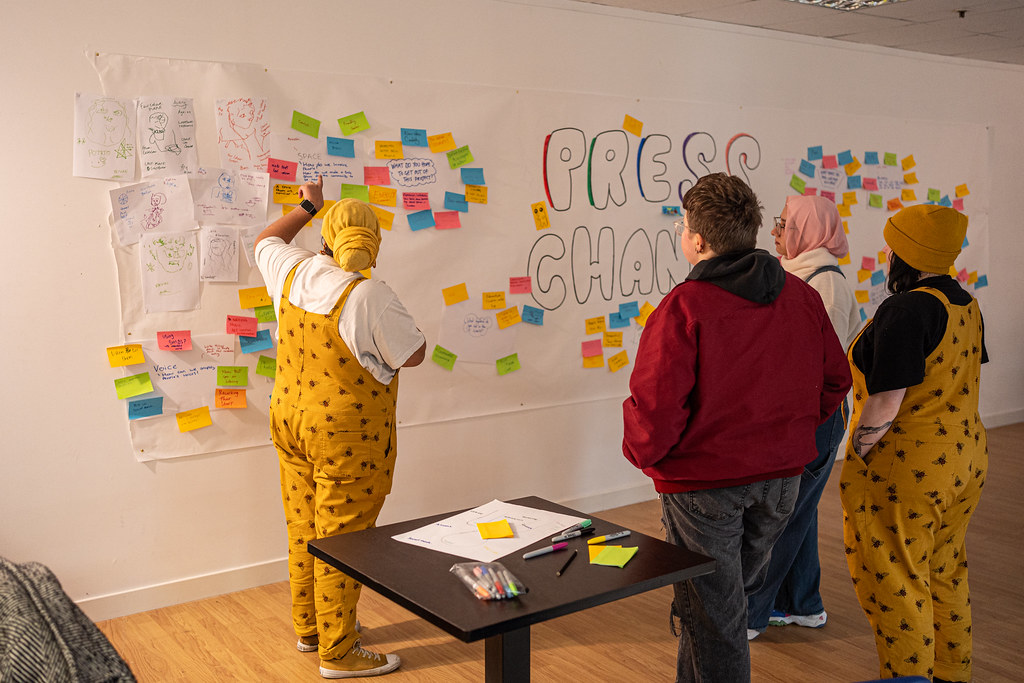
All this sits alongside a city whose creative and digital economy is one of the fastest-growing in Scotland. The contrast is stark that while Dundee’s creative sector thrives, too many of its young people remain on the outside.
Across Dundee, schools, youth and cultural organisations, charities, colleges and universities do extraordinary work, often with few resources, to meet young people’s needs and aspirations. Through art, music, design, performance, games and play, they create safe space conditions where young people can connect, express themselves, catalyse ideas and build confidence.
These creative practices sit within a broader framework that builds team working, imagination, storytelling and pitching skills, iterative design, honing intuition and democracy skills and so much more – all to get into the discipline of bringing and sharing ideas into the world, usually with other people. These future-proofed skills are not solely for creative practitioners, these are fundamental, transferable skills that our world depends on.
Whilst creative youth work is undeniably transformative, it is underinvested. Youth sport pathways in the UK often benefit from well-recognised systemic support and visibility from school onward; but the equivalent pathways for youth creativity feel far less visible. Active leisure and sport are of course essential, we are not denying this, but it’s clear from declining mental health rates that this is not enough. Given young people’s clear ambitions for creative careers, there are practical routes available to us to improve collective wellbeing and their future prospects.
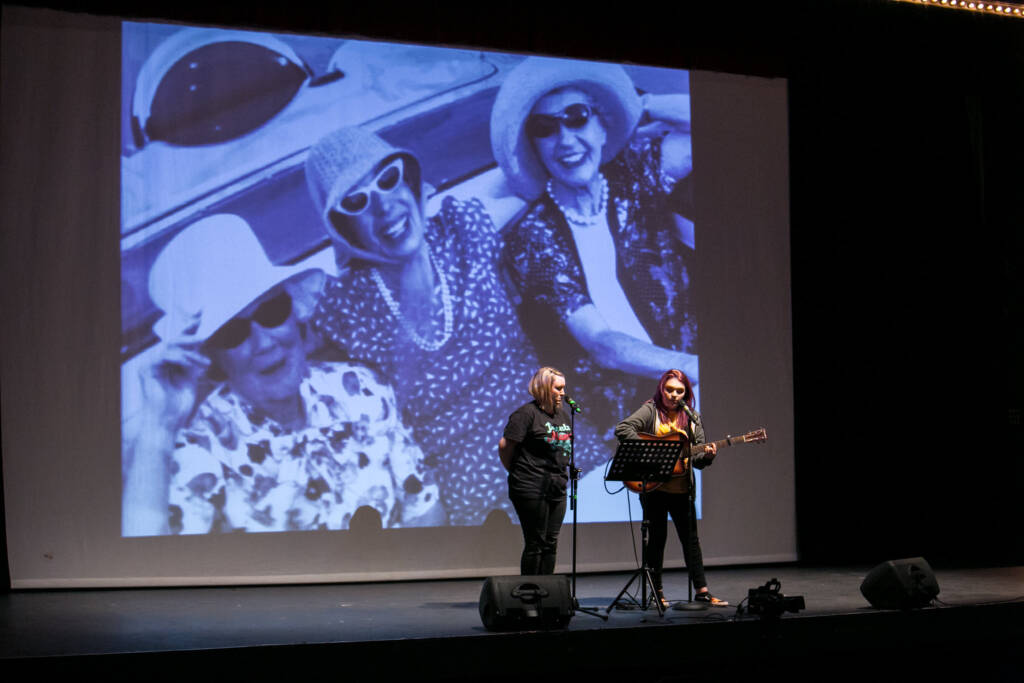
We only have to imagine what could change if Scotland invested in creativity with the same commitment it gives to sport – we’d see creative apprenticeships alongside youth football training, school playgrounds that offered creative making as well as games of tig, art incubators next door to sports halls, and design mentors as visible as our sports coaches.
Culture and creativity is civic glue, and young people have identified it as one of our strongest tools in navigating next – what impact could this investment make for future mental health, employability and business innovation rates?
Access to creativity for young people remains precarious – despite clear evidence that it also strengthens health and wellbeing, employability, civic participation, empathy and future skills. The discrepancy in access is also evidenced in the types of extracurricular activities accessed by young people within the Pupil Voice report (sports – 32% / creative arts – 20%).
If we are serious about building opportunity and wellbeing for Scotland’s young people, to be equipped in increasingly uncertain times; then we must listen to and invest in what young people need and value. Creativity is not an optional extra, it’s shaping the conditions to ensure the next generation thrives.
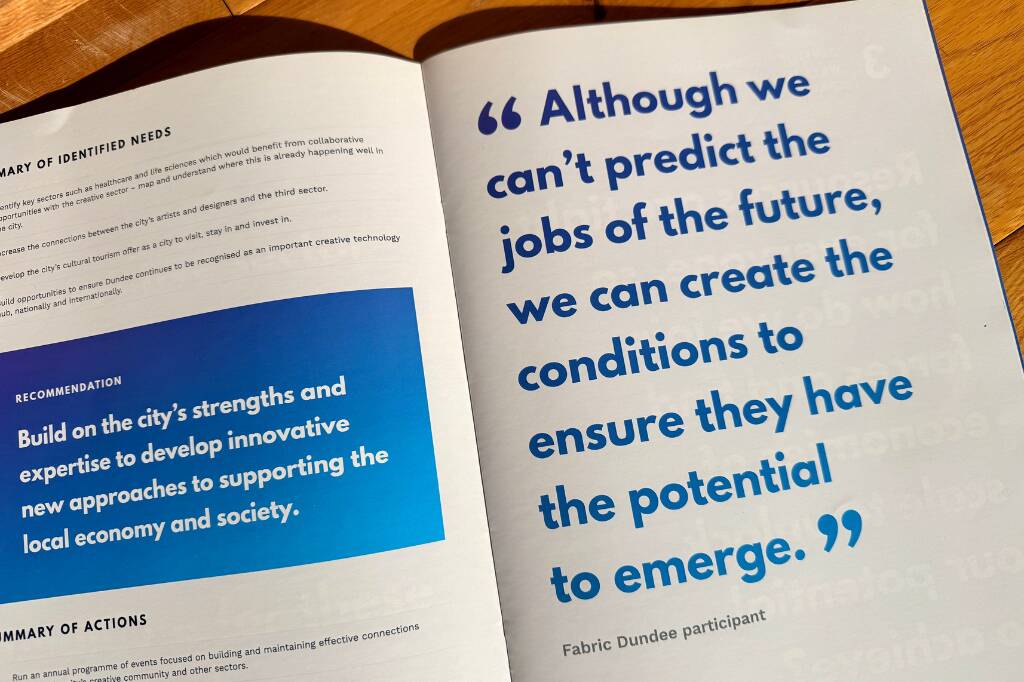
Revisiting the Pupil Voice stats and applying these to the whole of Scotland then we can estimate circa 26,000 pupils each year aspire to creative careers – young individuals who know that developing independent inquiry, critical thinking, empathy and storytelling skills will be essential for their futures. They will be entering a sector that already employs around 90,000 people in Scotland, contributes over £5.4 billion GVA to the economy, has significantly high levels of self employment and is evolving rapidly.
Every young person’s aspirations are shaped by what happens in school. While Dundee’s creative sector grows and young people increasingly want creative careers, our education system still rarely makes creativity visible as a viable pathway. Yet schools are the most universal point of contact we have with the next generation – the place where imagination, problem-solving and confidence are first formed by incredible teachers and staff, but too often, narrowed by a prescriptive system.
Freelancing, portfolio careers, hybrid work, and self-employment now define much of creative careers. For this generation to thrive, new pathways of support and models of training must reflect the reality of how creative work happens today.
Scotland has embraced the United Nations Convention on the Rights of the Child which sets out the fundamental rights all children should have. The UK Government’s Creative Industries Sector Plan and the Scottish Government’s Culture Strategy and Action Plan highlight investment in creative career services, skills, apprenticeships, fair work, and inclusion. The promise of better is there, now we must enact it.
We often ask what jobs will exist in the future – but the real challenge is what skills, strengths and sense of purpose young people will need to design futures that are both sustainable and fulfilling. As we head into budget season and next year’s elections, the evidence is clear even if the routes are still uncertain: skills learned through creative practice – collaboration, critical thinking, empathy, imagination and adaptability – are vital and transferable across every sector, from health and tech to the public sector and business. These aren’t just work skills, they’re life skills – the foundations of wellbeing, agency, and the ability to keep creating meaning in a world that keeps changing.
To policymakers, if wellbeing, equity, and prosperity are truly national goals – what is the country’s strategic plan to invest in young people’s creative ambitions and secure Scotland’s future?
Some of the organisations supporting young people with arts and creativity and/or professional development pathways in Dundee and nationally include:
Dundee’s schools; Duncan of Jordanstone School of Art & Design; Abertay University; Dundee & Angus College; Dundee’s libraries; DCA; V&A Dundee and the Young People’s Collective; Dundee Rep and Scottish Dance Theatre; The McManus; Dundee Youth Music Theatre; Hot Chocolate Trust; Feeling Strong; Scrap Antics; Comics Youth CIC; Showcase the Street; Doof Studios/Turn the Tables; Shaper/Caper; Boomerang; community centres including Arthurstone Art Group; community gardens; Make with the Knit Shop Dundee; Creative Scotland’s Learning and Young People team; Developing Young Workforce and Skills Development Scotland; Discover! Creative Careers; Scottish Careers Week.
For anyone interested in a creative career, you can join V&A Dundee and the Young People’s Collective from Wed 5–Fri 7 November for the Upstart: Creative Careers Festival. The event includes workshops, talks, making and a live recorded podcast exploring creative careers, and co-programmed by young people.
This feature is part of Creative Dundee’s Futures series – exploring publicly available datasets to consider culture and creativity, now and next in Dundee and Scotland. Find our previous feature on Dundee’s Creative & Digital Industries Capabilities.

If you would like to support us in creating even better content, please consider joining or supporting our Amps Community.